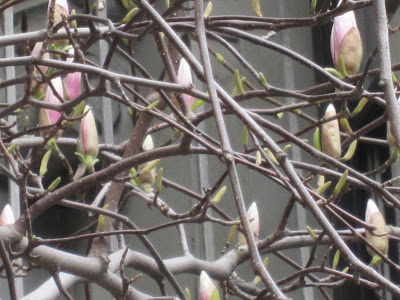 |
| The resilience of Magnolia blossoms has been undeterred by the vagaries of climate change in New York City. |
I'm doing
Fish Story in Memphis because I believe we can identify at least one point in that location, whose restoration can affect the entire bioregion. Fish are the key to those locations. Where they thrive, there is hope for the region. Where they falter, all the challenges of the anthropocene loom. Perhaps, where the Wolf River once met the Mississippi River we will find one of those critical points. Memphis is in an important bioregion. It includes the third largest watershed in the world, the largest in North America. The mississippi is the sixth largest river in the world. Both, and the fish that live there, are endangered by global warming, factory farm pollution, dredging, tributary diversions and the destruction of edging habitat long waterways.
The premise of trigger point theory (my dissertation topic), is that it is possible to identify small points of blockage, like acupuncture points on a human body, where activating that blockage can yield to energetic flow. My goal in Memphis next month is to identify those points.
There are twenty one days till
Fish Story begins in Memphis. A Rockethub crowd funding campaign was launched last week to support this work. I am working on a press release. I am exhausted, excited, worried and optimistic. I am exhausted by the preparations, excited about the potential, worried about everything that could go wrong and optimistic about what lies ahead: the people, the opportunities, the learning.
The
Fish Story team is remarkable, particularly the two scientists I work with.
Dr. James White, paleoecologist and
Dr. Eugene Turner, a wetlands biologist.
White was among the first scientists sounding alarms on global warming
and writing on the effects of vegetation to remediate climate change. Turner is a Gulf
of Mexico dead zone expert who has been working on the effects of the BP spill.
Fish Story is an investigative experiment couched in an endurance performance.
May 4, Dr. Turner and I will canoe the pristine Ghost River, headlands of the Wolf River, a former tributary of the Mississippi River, with the Wolf River Conservancy. We will be photographing fish habitat along the way.
May 7, we will gather at Crosstown Arts (see April 11 Post) with high school students. Our goal will be to create some maps of relationships between what is known and what is felt about connections between the waterways that fish depend upon. I will explain the ideas. We will play the Anthropocene Game (see January 23 Post). I ask people to sit, relax, close their eyes and let me sing to them, acapela in French, Faure's "Au Bord de L'Eau." Then we will make maps of what we know about fish in Memphis.
May 7-10, I will install work from those experiences at the Memphis College of Art.
May 11, we will project a webcast in the installation room at the College, to compare different parts of the country and possibly the world and the issues they are facing about climate change, animal habitat, particularly for fish and the implications for humans.
A month ago, I began training for these events. I have continued to move ahead with my dissertation writing, clarifying the ideas I will bring to the table there. I have stepped up my singing lessons and my voice is in better shape. Today I recorded the Faure song for the event at Crosstown Arts, even tho I plan to sing live. I have been going to the gym to build my strength and stamina. Several times I've collapsed from the effort and half way thru, hurt my foot by inflaming osetoarthritis. I just can't whip myself into shape the way I might have even twenty years ago. I soldier on and get stronger. I have always considered my Chronic Fatigue Syndrome (CFS see January 12 and March 1 Posts) to be a useful metaphor for the issues the planet faces under the duress of the Anthropocene. That is, if we can't continue to function as a healthy systems so we must discover how an unhealthy system builds resilience despite continued stressors, and thrive.
A recent article on the resilience of
collapsing systems, indicated that the rate of recovery for fragile systems can be enhanced by proximity to healthier systems. In other words, if one system fails, be sure to reinforce a neighbor. So in Memphis, we will start with the healthiest section, the Ghost River. In New York City, the days when I can't rain or even sing, I think. When my reserves build back up, I venture out, nourish myself with the exquisite spring unfurling of magnolia blossoms and resume the training that will prepare me for the lessons Memphis has to teach us.
 |
Senselessly, in the face of so much to be healed, came news of the bombings in Boston at the marathon finish line.
But no matter what, the promise of spring is that hope cannot be denied. |






